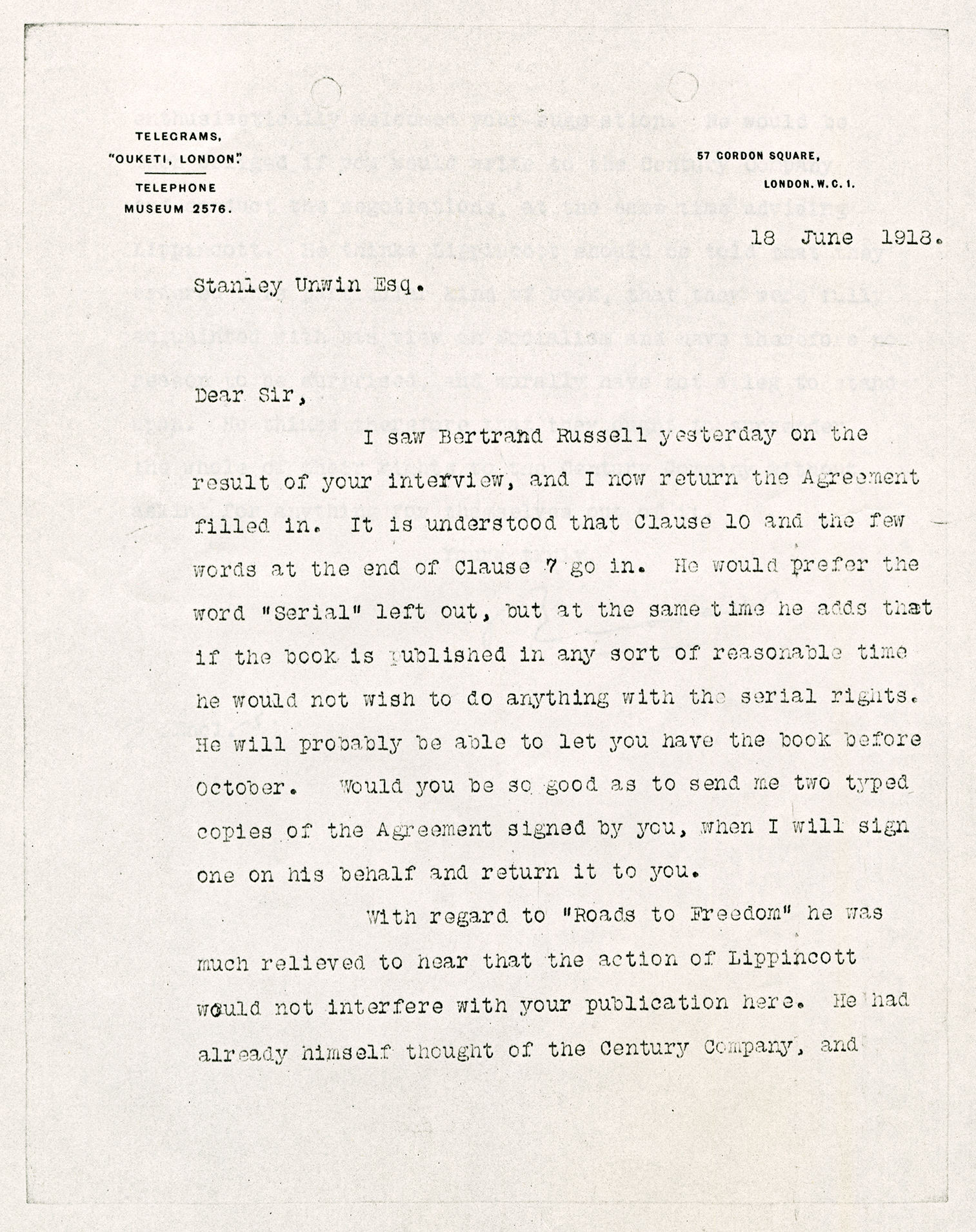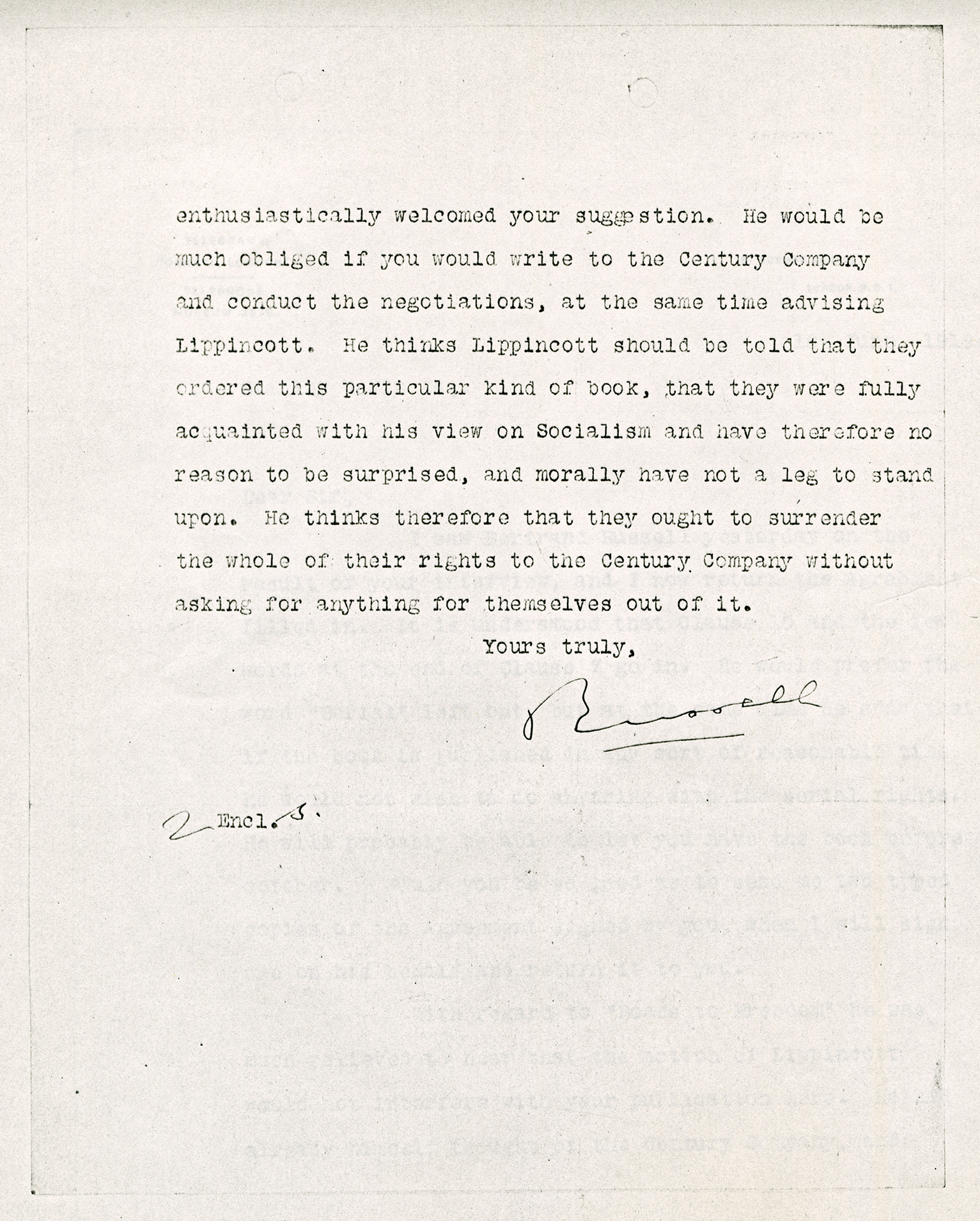Brixton Letter 21
BR to George Allen & Unwin Ltd. / Stanley Unwin (via Frank Russell)
June 18, 1918
- TLS
- Reading
- Edited by
Kenneth Blackwell
Andrew G. Bone
Nicholas Griffin
Sheila Turcon
Cite The Collected Letters of Bertrand Russell, https://russell-letters.mcmaster.ca/brixton-letter-21
BRACERS 48706
<letterhead>1
57 GORDON SQUARE,
LONDON, W.C.1.
18 June 1918.
Stanley Unwin Esq.
Dear Sir,
I saw Bertrand Russell yesterday on the result of your interview,2 and I now return the Agreement3 filled in. It is understood that Clause 10 and the few words at the end of Clause 7 go in. He would prefer the word “Serial” left out, but at the same time he adds that if the book is published in any sort of reasonable time he would not wish to do anything with the serial rights. He will probably be able to let you have the book before October.4 Would you be so good as to send me two typed copies of the Agreement signed by you, when I will sign one on his behalf and return it to you.
With regard to Roads to Freedom he was much relieved to hear that the action of Lippincott5 would not interfere with your publication here. He had already himself thought of the Century Company,6 and enthusiastically welcomed your suggestion. He would be much obliged if you would write to the Century Company and conduct the negotiations, at the same time advising Lippincott. He thinks Lippincott should be told that they ordered this particular kind of book, that they were fully acquainted with his view on Socialism and have therefore no reason to be surprised, and morally have not a leg to stand upon. He thinks therefore that they ought to surrender the whole of their rights to the Century Company without asking for anything for themselves out of it.
2 Encls.a
- 1
[document] The letter, written and signed by Frank Russell on BR’s behalf, was edited from a photocopy in the Russell Archives of the typed original in the Allen & Unwin archives at the University of Reading.
- 2
your interview This suggests, in the absence of other possibilities, that Stanley Unwin visited BR in Brixton, perhaps during the week of 12 June when Colette and Elizabeth were BR’s only other known visitors.
- 3
the Agreement The draft agreement was for Introduction to Mathematical Philosophy and is in the Allen & Unwin files (photocopy in RA Rec. Acq. 70, box 6.43). Clause 10 concerned the “American, Colonial, Continental, Foreign, translation and serial rights”. The percentage to be paid the author, 90%, was inserted in Frank’s hand. BR annotated the royalty scale in clause 7: “Should start at 15%, rising to 17½% after 1500 and 20% after 3000”. He annotated clause 16, concerning the advance on royalties: “The whole £50 should be payable on delivery of the MS.” It was so paid; see Letter 98 and note 3.
- 4
let you have the book before October In fact, Unwin had it by at least 3 September 1918 (note 3 to Letter 98).
- 5
Roads to Freedom ... the action of Lippincott The J.B. Lippincott Company had contracted with BR on 11 October 1917 for a book then entitled Three Types of Radicalism: Socialism, Anarchism and Syndicalism, to be delivered within six months from that date. He decided in February 1918 to write the book before he entered prison, and did write it. Stanley Unwin had read it by his letter of 15 April 1918 (BRACERS 50641). Lippincott had reviewed the typed manuscript by 23 May 1918 (their letter, BRACERS 48708), which by then bore the title Three Roads to Freedom. They told BR they could not publish it “on account of present conditions”, which meant, in their terms, Americans’ antipathy to socialism. Nor would the treatment of the subject “pass censorship”: “we cannot bring out the book while the war continues and that ordinary revisions would not be sufficient to overcome the objections.” By this time Unwin was setting the book into type. Despite BR’s entreaties, Lippincott had not secured a replacement American publisher, and now Allen & Unwin appeared to be its only publisher. See also Letter 23.
- 6
Century Company Century was the US publisher of Why Men Fight (1917), the American title of Principles of Social Reconstruction (1916). The eventual US publisher of Roads to Freedom was Henry Holt, who entitled it Proposed Roads to Freedom (1919).
- 7
Russell BR himself, after he succeeded to the earldom in 1931, used this simple but formally correct form of the Earl Russell’s name to sign applications, wills, etc.
Textual Notes
- a
2 Encls. Altered by hand from “Encl.”
57 Gordon Square
The London home of BR’s brother, Frank, 57 Gordon Square is in Bloomsbury. BR lived there, when he was in London, from August 1916 to April 1918, with the exception of January and part of February 1917.
Brixton Prison
Located in southwest London Brixton is the capital’s oldest prison. It opened in 1820 as the Surrey House of Correction for minor offenders of both sexes, but became a women-only convict prison in the 1850s. Brixton was a military prison from 1882 until 1898, after which it served as a “local” prison for male offenders sentenced to two years or less, and as London’s main remand centre for those in custody awaiting trial. The prison could hold up to 800 inmates. Originally under local authority jurisdiction, local prisons were transferred to Home Office control in 1878 in an attempt to establish uniform conditions of confinement. These facilities were distinct from “convict” prisons reserved for more serious or repeat offenders sentenced to longer terms of penal servitude.
Constance Malleson
Lady Constance Malleson (1895–1975), actress and author, was the daughter of Hugh Annesley, 5th Earl Annesley, and his second wife, Priscilla. “Colette” (as she was known to BR) was raised at the family home, Castlewellan Castle, County Down, Northern Ireland. Becoming an actress was an unusual path for a woman of her class. She studied at Tree’s (later the Royal Academy of Dramatic Art), debuting in 1914 with the stage name of Colette O’Niel at the Duke of York’s Theatre, London, in a student production. She married fellow actor Miles Malleson (1888–1969) in 1915 because her family would not allow them to live together. In 1916 Colette met BR through the No-Conscription Fellowship and began a love affair with him that lasted until 1920. The affair was rekindled twice, in 1929 and 1948; they remained friends for the rest of his life. She had a great talent for making and keeping friends. Colette acted in London and the provinces. She toured South Africa in 1928–29 and the Middle East, Greece and Italy in 1932 in Lewis Casson and Sybil Thorndike’s company. She acted in two films, both in 1918, Hindle Wakes and The Admirable Crichton, each now lost. With BR’s encouragement she began a writing career, publishing a short story in The English Review in 1919. She published other short stories as well as hundreds of articles and book reviews. Colette wrote two novels — The Coming Back (1933) and Fear in the Heart (1936) — as well as two autobiographies — After Ten Years (1931) and In the North (1946). She was a fierce defender of Finland, where she had lived before the outbreak of World War II. Letters from her appeared in The Times and The Manchester Guardian. Another of her causes was mental health. She died five years after BR in Lavenham, Suffolk, where she spent her final years. See S. Turcon, “A Bibliography of Constance Malleson”, Russell 32 (2012): 175–90.
Elizabeth Russell
Elizabeth Russell, born Mary Annette Beauchamp (1866–1941), was a novelist who in 1891 married Graf von Arnim-Schlagenthin. She became known as “Elizabeth”, the name she used in publishing Elizabeth and Her German Garden (1898), and she remained widely known as Elizabeth von Arnim, although the Library of Congress catalogues her as Mary Annette (Beauchamp), Countess von Arnim. She was a widow when she married BR’s brother, Frank, on 11 February 1916. The marriage was quickly in difficulty; she left it for good in March 1919, but they were never divorced and she remained Countess Russell (becoming Dowager Countess after Frank’s death in 1931).
Frank Russell
John Francis (“Frank”) Stanley Russell (1865–1931; 2nd Earl Russell from 1878), BR’s older brother. Author of Lay Sermons (1902), Divorce (1912), and My Life and Adventures (1923). BR remembered Frank bullying him as a child and as having the character and appearance of a Stanley, but also as giving him his first geometry lessons (Auto. 1: 26, 36). He was accomplished in many fields: sailor, electrician, house builder, pioneer motorist, local politician, lawyer, businessman and company director, and (later) constructive junior member of the second Labour Government. Frank was married three times. The first marriage involved serious legal actions by and against his wife and her mother, but a previous scandal, which ended his career at Oxford, had an overshadowing effect on his life (see Ruth Derham, “‘A Very Improper Friend’: the Influence of Jowett and Oxford on Frank Russell”, Russell 37 [2017]: 271–87). The second marriage was to Mollie Sommerville (see Ian Watson, “Mollie, Countess Russell”, Russell 23 [2003]: 65–8). The third was to Elizabeth, Countess von Arnim. Despite difficulties with him, BR declared from prison: “No prisoner can ever have had such a helpful brother” (Letter 20).
George Allen & Unwin Ltd.
George Allen & Unwin Ltd., founded by Stanley Unwin in 1914, was BR’s chief British publisher, had published Principles of Social Reconstruction in 1916, and was in the process of publishing Roads to Freedom (1918) while BR was in Brixton.
Stanley Unwin
Stanley Unwin (1884–1968; knighted in 1946) became, in the course of a long business career, an influential figure in British publishing and, indeed, the book trade globally — for which he lobbied persistently for the removal of fiscal and bureaucratic impediments to the sale of printed matter (see his The Truth about a Publisher: an Autobiographical Record [London: Allen & Unwin, 1960], pp. 294–304). In 1916 Principles of Social Reconstruction became the first of many BR titles to appear under the imprint of Allen & Unwin, with which his name as an author is most closely associated. Along with G.D.H. Cole, R.H. Tawney and Harold Laski, BR was notable among several writers of the Left on the publishing house’s increasingly impressive list of authors. Unwin himself was a committed pacifist who conscientiously objected to the First World War but chose to serve as a nurse in a Voluntary Aid Detachment. With occasional departures, BR remained with the company for the rest of his life (and posthumously), while Unwin also acted for him as literary agent with book publishers in most overseas markets.
The J.B. Lippincott Company
J.B. Lippincott Company, founded in 1836, was one of the world’s largest publishers. How it came to approach BR in 1917 is unknown, but it followed upon the success of the Century Company’s US publication of Why Men Fight (1917), the retitled Principles of Social Reconstruction (1916). See Letter 21, note 6.

